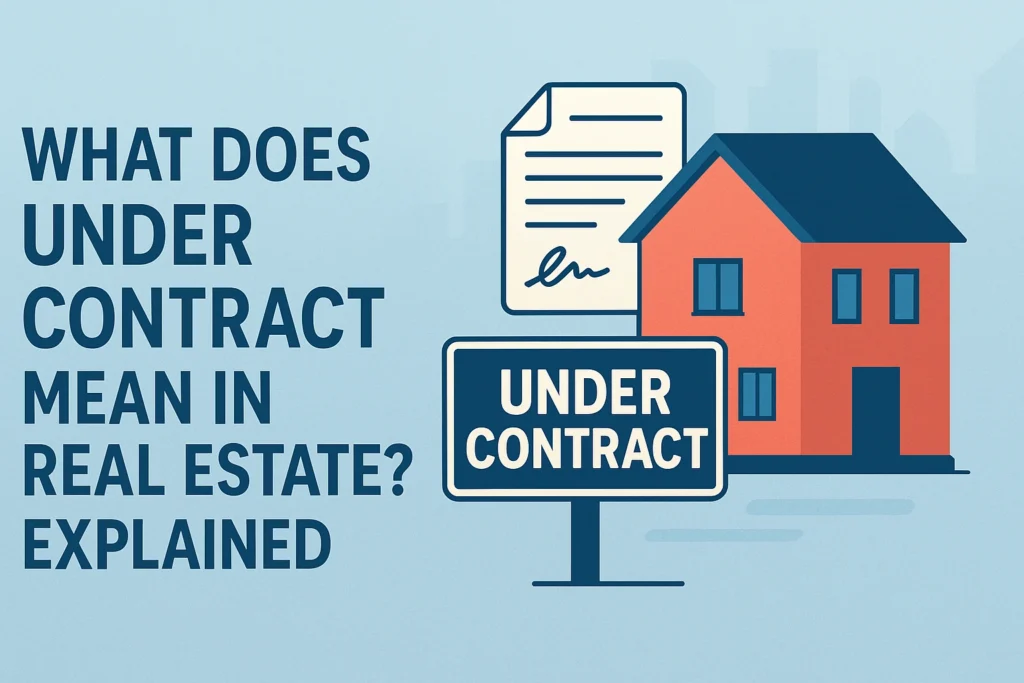Introduction – What Does “Under Contract” Mean in Real Estate?
When homebuyers first hear the phrase what does under contract mean in real estate, it often creates confusion. In simple terms, a house under contract means the seller has accepted an offer, but the property isn’t officially sold yet. Buyers and sellers move through steps like contingencies, inspections, and financing before closing. As you explore property insights on Tech-Radars, you’ll notice how terms such as pending, contingent, or real estate contract process shape the overall transaction timeline.
Understanding “Under Contract” in Real Estate
In real estate, the term under contract means the seller has accepted an offer but the deal is not yet closed. Many wonder house under contract meaning or whether it’s the same as pending. The truth is, being under contract signals the property has moved into the real estate contract process, which includes contingencies such as inspection, financing, and appraisal. Knowing pending vs under contract in real estate is essential because it helps buyers understand the transaction timeline and avoid confusion. Recognizing this stage is important in property transactions as it guides expectations during the home buying process.
Key Stages in a Real Estate Contract
Offer Accepted
The first step in the real estate contract process begins when the seller accepts the buyer’s offer. At this stage, the home isn’t sold but marked as under contract. Both parties agree on terms, including price and timeline, before moving forward.
Contingencies
A house under contract usually includes contingencies. Common ones are financing approval, a home inspection to check property condition, and an appraisal ensuring the value matches the loan. These conditions must be satisfied before closing.
Pending vs Under Contract
- Under contract: Offer accepted, contingencies remain.
- Pending: Contingencies cleared, sale close to completion.
How Long Does a House Stay Under Contract?
On average, a house stays under contract for 30 to 60 days, though the real estate transaction timeline can vary. Factors such as financing approval, inspection results, and appraisal delays often affect how long a property remains in the contract phase. For buyers, understanding this period helps manage expectations during the home buying process. Sellers also benefit by preparing documents early to avoid delays. While some homes close quickly, others may extend beyond two months depending on contingencies.
Contract Stages with Average Timelines
| Stage | Average Duration | Notes |
|---|---|---|
| Offer to Contract | 3–7 days | Negotiation period |
| Under Contract | 30–60 days | Includes contingencies |
| Closing | 1–2 weeks | Final paperwork |
Contingent vs Under Contract – What’s the Difference?
Homebuyers often confuse contingent with under contract in real estate, but they signal different stages of the transaction timeline. A contingent status means the seller has accepted an offer, yet certain conditions, such as financing, appraisal, or inspection, must be met before the deal progresses. On the other hand, under contract shows the property is further along in the real estate contract process. Understanding these terms helps buyers know whether a house is still open for backup offers.
- Contingent: Offer accepted, but active contingencies remain.
- Under Contract: Most contingencies agreed, moving closer to closing.
Common Reasons Why a Contract Might Fall Through
Even after a property goes under contract in real estate, not every deal makes it to closing. Several issues can interrupt the real estate contract process, causing buyers or sellers to walk away. Financing remains the most common challenge, as lenders may deny approval. Failed inspections can reveal costly repairs, while a low appraisal might prevent loan approval. In some cases, buyers or sellers simply change their minds. Understanding these risks helps both parties prepare for setbacks during the home buying process.
- Financing issues – loan not approved
- Failed inspection – major repairs discovered
- Low appraisal – value doesn’t meet offer
- Buyer or seller backs out – personal or legal reasons
Related Real Estate Insights
Real estate transactions involve many terms that can confuse buyers and sellers. Knowing what does under contract mean in real estate is just one part of understanding the overall process. For instance, financial aspects also play a huge role in property decisions. Just as understanding tax terms like real estate taxes vs property taxes is important, learning about contract stages helps buyers avoid costly mistakes. Both legal agreements and tax obligations shape the real estate journey, so staying informed ensures smoother negotiations and better decisions throughout the home buying process.
FAQs About “Under Contract” in Real Estate
What happens after a house goes under contract?
Once a home is under contract, the real estate contract process begins with inspections, financing, and appraisal before closing.
Can you still make an offer on a house under contract?
Yes, but it’s usually a backup offer. The primary buyer has priority until contingencies are resolved.
Does under contract mean the house is sold?
No, it means the seller accepted an offer, but the deal isn’t final until closing.
How is “pending” different from “under contract”?
Pending means contingencies are cleared, while under contract means they’re still active.
Can a seller back out after going under contract?
In rare cases, yes, but legal and financial penalties may apply depending on the agreement.
Conclusion
Understanding what does under contract mean in real estate is essential for buyers and sellers navigating the home buying process. When a property is under contract, the seller has accepted an offer, but important steps such as contingencies, inspections, financing, and appraisal still need to be completed. It signals progress in the real estate contract process but does not mean the house is officially sold. Recognizing this stage helps manage expectations and prepares both parties for closing. Think of it as a milestone toward ownership rather than the final sale itself.


